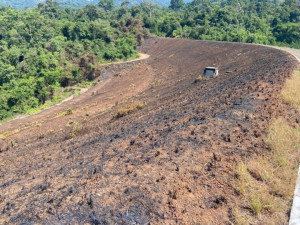By Esther Wright
The tranquillity of the forests surrounding the Guma Dam was shattered on April 27th, 2024, when nefarious actors deliberately ignited a blaze, threatening Freetown’s vital water source. This brazen act of destruction not only endangers the dam’s immediate stability but also poses grave risks to the well-being of the city’s residents.
As the primary water supplier to Freetown, the Guma Valley Water Company Dam stands as a lifeline for over one million people. However, encroachments and deforestation in its vicinity have heightened concerns about its sustainability. The recent incident underscores the vulnerability of this critical infrastructure.
The implications of this deliberate act are dire and far-reaching. Foremost is the risk of disrupting water supply, potentially triggering a humanitarian crisis with profound impacts on public health, sanitation, and food security. The sudden scarcity of water could disrupt daily life and industrial operations, exacerbating existing challenges.
Moreover, the destruction of the dam embankment heightens the threat of downstream flooding, particularly in densely populated areas of Freetown. Such inundation could result in loss of life, displacement, and economic hardship, compounding the city’s vulnerabilities.
Beyond immediate concerns, the aftermath of a potential dam failure would entail long-term environmental and socio-economic consequences. Contamination of water sources, infrastructure damage, and economic disruptions would hinder recovery efforts and strain resources, prolonging the city’s recovery.
To address this urgent threat, concerted action is needed to safeguard critical infrastructure and enhance resilience. Measures to prevent sabotage, improve emergency preparedness and diversify water sources are essential to mitigate risks and ensure water security for Freetown.
Furthermore, fostering a culture of community engagement and environmental stewardship is crucial in promoting shared responsibility for resources like the Guma Dam. By uniting efforts to protect and preserve vital lifelines, Freetown can build resilience against adversity and secure a sustainable future.
It must be noted that the deliberate burning of the Guma Dam embankment serves as a stark reminder of the fragility of essential infrastructure and the urgent need for collective action to address threats to water security. Only through concerted efforts can Freetown mitigate risks and safeguard the well-being of its residents.





